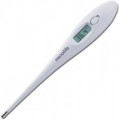Measurement range
The range of temperatures that a thermometer can measure.
For measuring body temperature, a range of 35 – 43 °C is considered ample, covering values encountered in individuals with high fever or hypothermia. Although modern medical thermometers may have broader ranges, especially those designed for water and air temperature measurement (e.g., -20 – 100 °C), when used for body temperature, they typically operate within a narrower range. The overall and "solid" measurement ranges are often specified separately in these thermometers.
Measurement accuracy
The extent to which a device deviates from the actual temperature during measurements determines its accuracy. Even the least accurate electronic medical thermometers today have a maximum deviation of 0.3 °C, sufficient for everyday and basic medical use. Common models offer even higher accuracy, with deviations as low as
0.1 °C or
0.2 °C, making the pursuit of maximum accuracy necessary only in specific scenarios.
Waterproof case
The presence in the design
waterproof case. This feature allows you to thoroughly wash the thermometer; this is especially important for multi-application models (see above) and when using the same device for multiple patients.
